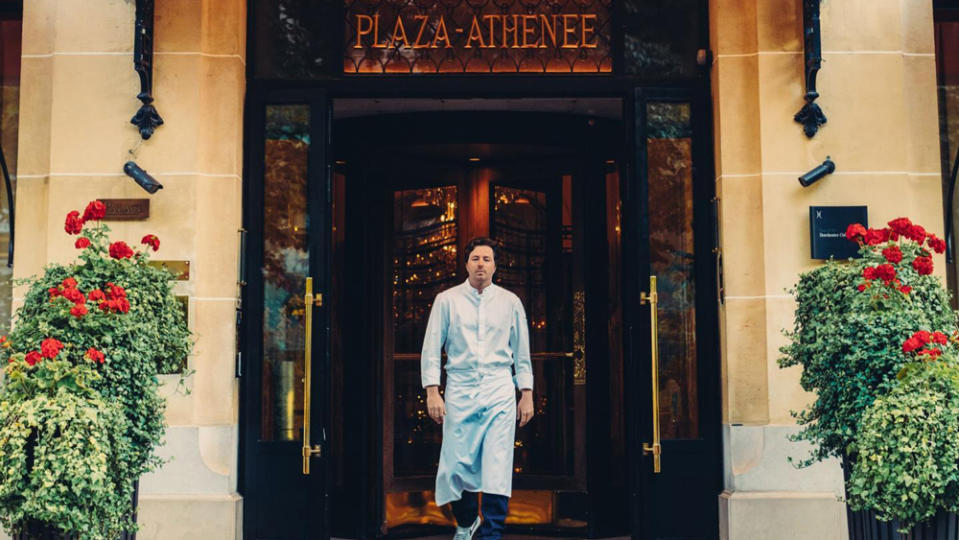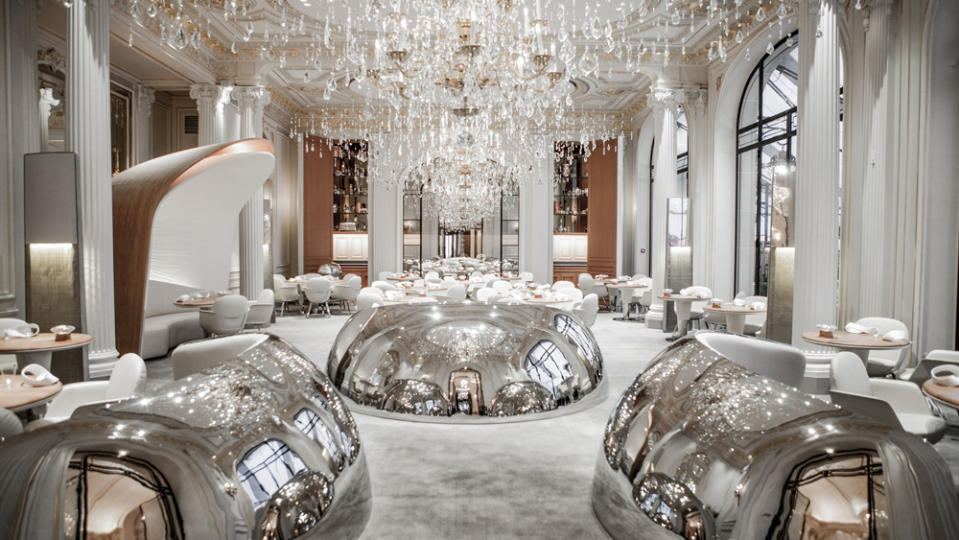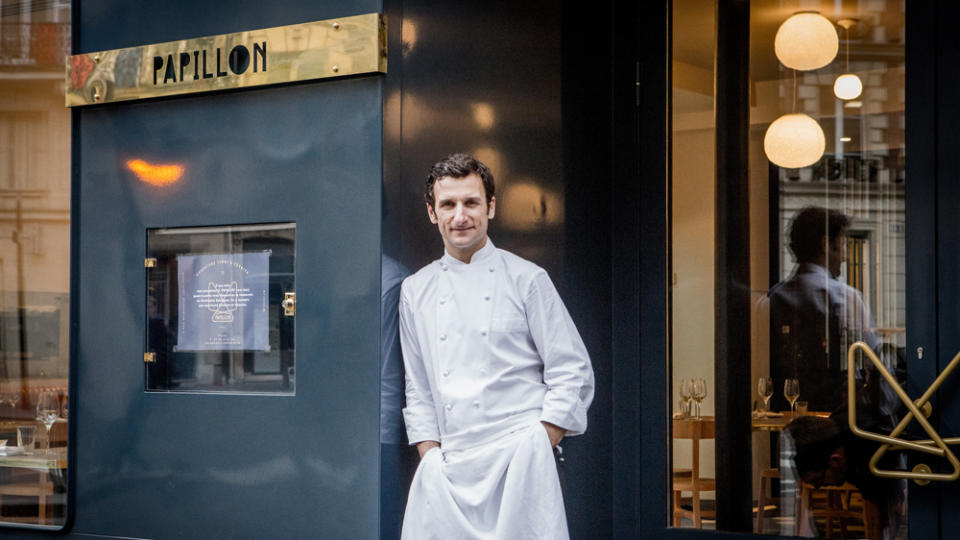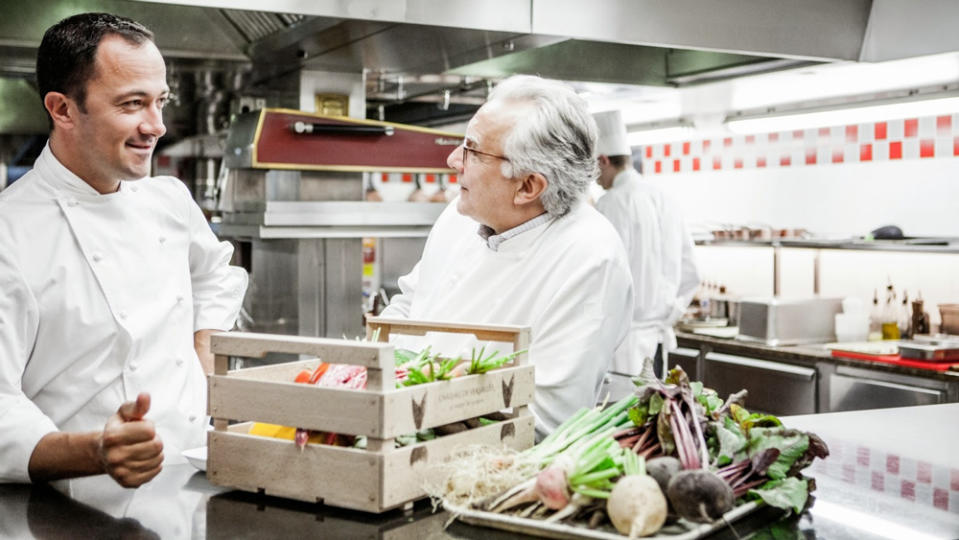Alain Ducasse Leaves the Restaurant Where He Tried to Spark a Fine Dining Revolution

When news broke that chef Alain Ducasse would part ways with the luxurious, five-star hotel Plaza Athénée which, for the last 21 years housed a Michelin-starred restaurant bearing his name, jaws dropped in Paris’s food and media world.
Le Parisien newspaper called the news “seismic” and headlines in Le Point and Le Figaro both screamed “Alain Ducasse and the Plaza Athénée, they’re finished!” punctuated with dramatic exclamation marks.
More from Robb Report
The Chef Who Led the World's First Michelin-Starred Brewpub Is Now Tackling Italian
The 3 Best New City Hotels, From Madrid to Paris to Dallas, Texas
Exclusive: First Look at Casa Limone, an Acclaimed Italian Chef's American Debut
The histrionics aren’t entirely misplaced. After all, restaurant Alain Ducasse at the Plaza Athénée was one of the city’s most illustrious dining destinations, not only for its three Michelin stars, but for shaking up the world of haute gastronomy with a game-changing concept that took meat off a fine dining menu while focusing on pillars of sustainable, healthy and ethical consumption. Despite Ducasse’s myriad accomplishments, the move shows even the greats can get pushed out.
Rumors of the legendary chef’s departure first broke in May, kicking the local gossip machine into overdrive. A May 17 press release from the luxury hotel operator Dorchester Collection confirmed the rumors: “The partnership between Le Plaza Athénée and Alain Ducasse will not be renewed when it expires on June 30.”
There is some speculation that the partnership proved too costly for the hotel, but the exact reason for the separation is still unclear. Meanwhile, on June 15, rumors that a young, 39-year-old chef to the stars, Jean Imbert, would be taking Ducasse’s place proved to be true, with both the hotel and the chef sharing the announcement on social media.

Photo: courtesy Plaza Athenee
Imbert has a big toque to fill, as food critic Thibaut Danancher suggests, given the legacy the restaurant leaves on the Parisian landscape.
It’s been seven years now, but Danancher recalls in vivid detail a fish dish he ate at the restaurant, because it was so unlike any fish dish he had eaten before: It tasted like meat.
It was a red mullet, which in France is described as the game of the sea for its strong flavor, and was dressed in an intensely rich sauce made from the fish liver. He was given a fork and knife with his dish, and used the tools to slice into the thick, plump flesh, as though it were a steak.
“I had the impression I was eating game meat, the taste was so strong,” he said. “The texture of the fish also reminded me of meat. And then you also had a knife and fork, so you had all the codes of the red meat experience.”
For Danancher, whose food columns appear in the weekly French news magazine Le Point, the experience was revelatory and helped him better understand the new culinary concept that Ducasse was introducing at the time back in 2014, to the great surprise of the gastronomic world: a meatless menu centered around fish, vegetables and grains christened “Naturalité.”
“There is an absolute necessity to go towards a better way of eating, in harmony with nature, healthier and more environmentally friendly,” Ducasse said at the time. “I am convinced that the time has come to give an interpretation of haute cuisine to these modest products. In my opinion, this is not a constraint. It is a world of new flavors that I am offering my clients to explore.”
The news that Ducasse would eliminate all meat at the luxurious restaurant he had helmed since 2000 raised eyebrows and drew skepticism.

Courtesy of Pierre Monetta/Alain Ducasse au Plaza Athénée
It wasn’t the first time a fine dining institution in Paris introduced a vegetarian menu. Back in 2001, at the height of the mad cow disease crisis, Alain Passard, who up to then had built up a reputation as a master of meats, announced to the great shock of the food world that he would ban red meat from his menu at Arpège and give vegetables the starring role. Eventually, though, he would reintroduce meats back to the kitchen alongside vegetarian menus.
It’s not even the first time Ducasse would introduce a vegetarian menu at one of his fine dining restaurants. Danancher points out that in 1987, the chef launched a vegetable-centric menu at his restaurant Louis XV at the lavish Hotel de Paris in Monaco.
But at the Plaza Athénée, Ducasse’s vision was unflappable. For the sake of the planet and his guests’ health, the restaurant would shift away from animal proteins and turn a trilogy of ingredients—fish, vegetables and grains—into a fine dining experience.
“It was a huge upheaval back then,” Danancher says. “Many said he was taking a risk with this kind of philosophy and doubted its future.”
But two years later in 2016, the restaurant earned three Michelin stars.
“For a Palace hotel, this was really innovative,” adds chef Christophe Saintagne, who worked at the restaurant for two years when it first opened in 2000, and then between 2010 and 2013 as executive chef, helping to lay the groundwork for the Naturalité concept. In France, exceptional five-star hotels can obtain the status of Palace hotel and Ducasse’s approach could be seen as a departure for the setting. “The people who dine at a Palace are among the richest in the world and price is often not an obstacle. And here we’re not necessarily presenting you with the most beautiful plate, but dishes that are good and healthy.”

Photo: courtesy Pierre Monetta
Naturalité was also a reaction to years of fusion cuisine and molecular gastronomy which came to dominate haute cuisine in the 1990s and early 2000s, Saintagne said. By contrast, the new menu brought the focus back on quality ingredients, stripped recipes of all pretense, and simplified dishes to make them more straightforward and understandable for the diner.
Before Ducasse formally made the switch to Naturalité in 2014, the pair also worked together on the book Alain Ducasse Nature: Simple, Healthy, and Good which was published in 2009.
“He really taught me how to make my cuisine more straightforward and to bring more sincerity to my cooking,” Saintagne said.
It was also while leading the kitchen as executive chef that Saintagne experienced a professional epiphany that would shape his own culinary philosophy going forward at his restaurant Papillon in the 17th arrondissement.
During a dinner service, the restaurant manager came to the kitchen with a special request: one of the guests loved scallops but didn’t eat anything cooked, presumably a disciple of the raw food diet. Annoyed at first, Saintagne made up a dish on the fly by taking fresh scallops, cutting them in two, dousing them with olive oil, salt and pepper and topping them off with a few slivers of white truffle. A few moments later, the manager sailed back into the kitchen carrying a message from his guest, who proclaimed the dish to be one of the best things he had ever eaten in his life.
“At that moment, it all just clicked,” he said. “I realized I shouldn’t be so focused on perfecting my techniques or of my job but think only about how the guest will feel, about the emotion, about simplicity, contrast and temperature in a plate. It’s about putting your savoir-faire to work for the guest and putting aside my ego. I didn’t see my job in the same way after that.”
Ducasse’s planet-friendly ethos also has echoes today at Eleven Madison Park, where chef Daniel Humm announced recently that his New York restaurant would adopt a plant-based menu, and at ONA in southwestern France, which became the first vegan restaurant in the country to earn a Michelin star this year.
When Imbert, who rose to fame in France after winning the French edition of Top Chef in 2012, takes over the restaurant, it will mark the end of an era for both the hotel and Ducasse. Because as Danancher points out, unlike most hotel restaurant collaborations in which chefs inherit old legacies and kitchens, the restaurant Alain Ducasse at the Plaza Athénée was all Ducasse: He created the menu and culinary concept but also had his say in the design and architecture of the dining room.
“The whole atmosphere and spirit of the place was Alain Ducasse,” he said.
It was also Ducasse who raised the bar for hotel restaurants in Paris, earning three stars for the restaurant just months after opening in 2000.
“Before him, there were no three Michelin-starred hotel restaurants. He was really revolutionary.”

Though he closes the chapter on one restaurant, this spring Ducasse was busy opening another new project, this time at Le Grand Contrôle, the first hotel to open within the gold-gilded gates of Versailles. Meanwhile, in the handover, the fates of the restaurant’s executive chef Romain Meder and the pastry chef Jessica Préalpato remain unclear.
Between Danancher and Saintagne, Imbert’s appointment is described as surprising, radical and courageous. He’s 39, self-taught and has never held a Michelin star. But it’s also widely seen as a strategic choice that will target a younger clientele, and his long list of celebrity A-list friends: He’s cooked for Beyoncé and Jay-Z, Margot Robbie, Kristen Stewart, Justin Timberlake, Robert De Niro, Jennifer Lawrence, Al Pacino and Pharrell Williams, with whom he runs several restaurants in Miami and St. Tropez.
“It’s a courageous choice for both the hotel and Imbert,” Saintagne said. “What’s certain is that his every move will be under a magnifying glass.”
Best of Robb Report
Why a Heritage Turkey Is the Best Thanksgiving Bird—and How to Get One
From Stogies to Lighters: The 13 Best Gifts for Cigar Smokers
Sign up for Robb Report's Newsletter. For the latest news, follow us on Facebook, Twitter, and Instagram.

